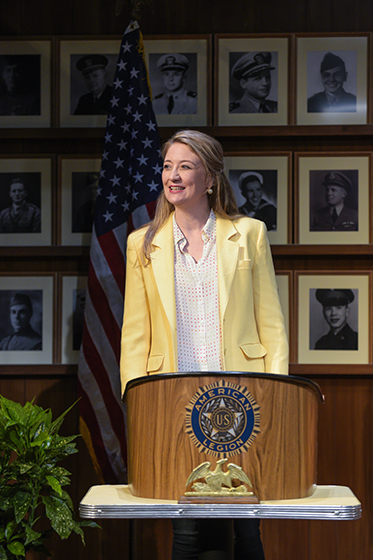* * *
Rarely has a new play by a modestly well-known writer been greeted with such lockstep enthusiasm as has Heidi Schreck’s “What the Constitution Means to Me.” The off-Broadway run having received universally favorable reviews, Ms. Schreck’s play has transferred to Broadway, where it is being touted as a Tony-and-Pulitzer favorite. Sometimes such unanimity is a sign of distinction, but just as often it’s an indication that a play is going over big because it tells the audience precisely what it wants to hear—and nothing more. Such is the case with “What the Constitution Means to Me,” which is not without merit but is no more a masterpiece than Tarell Alvin McCraney’s “Choir Boy,” another recent hit that clangs the bell of cozy progressive sentiment.

If you’ve seen any of Sarah Ruhl’s plays, you’ll recognize the tone and approach of “What the Constitution Means to Me,” which is very much in Ms. Ruhl’s aggressively ingratiating manner. It’s a three-person show in which Ms. Schreck plays herself in the present and at the age of 15, back in the days when she earned scholarship money by entering public-speaking tournaments. Her specialty was the American Legion-sponsored competition that gives her play its title. The scene is a small-town American Legion hall circa 1989, and the first part of the play consists of what Ms. Schreck claims to be a close replica of her prize-winning speech, interspersed with present-day reminiscences of her youth, family life and ancestors….
I mentioned a moment ago the tone of Ms. Schreck’s play and performance. It is the most Ruhl-like aspect of “What the Constitution Means to Me,” for the 15-year-old self whom she portrays in the show is, not to put too fine a point on it, effusively twee: “When I was a little girl, I had an imaginary friend named Reba McEntire. She was not related to the singer. Just because the Constitution does not proclaim the having of imaginary friends as a right does not mean I can be thrown in jail for being friends with Reba McEntire.” The point, I assume, is to show us what Ms. Schreck was like prior to her emergence as a mature, wised-up feminist who has put away childish things, though it turns out that her grown-up self is also given to Ruhl-style explosions of coyness…
These, however, have a different purpose, which is to make the serious section of her play more palatable. That part is in fact devastatingly harsh, for most of Ms. Schreck’s male ancestors, her father excluded, were vicious brutes who treated their spouses and children so savagely that the audience at the preview I attended gasped—as well it should have—to hear what they did. No amount of sugar can make such a spiky pill go down more smoothly, and Ms. Schreck’s account of her heritage of violence is by far the best part of “What the Constitution Means to Me.” The problem, one that is again familiar from Ms. Ruhl’s work, is that Ms. Schreck, for whatever reason, is rarely willing to grapple directly, at least not for very long, with the raw emotions triggered by her truth-telling. Hence she slathers them with a thick layer of Irony Lite…
* * *
Read the whole thing here.Heidi Schreck talks about What the Constitution Means to Me:







